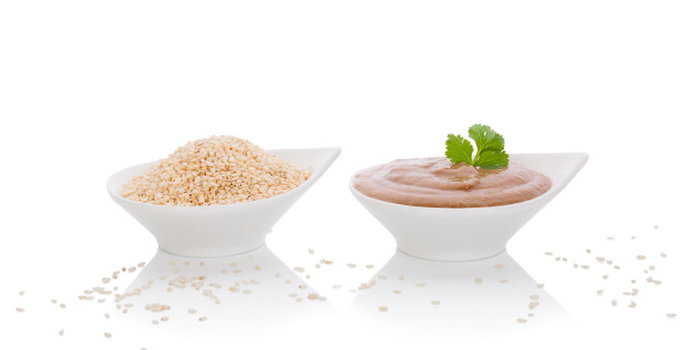Tahini is a popular ingredient in Middle Eastern and Asian cuisine. However, due to its high nutritive content, this product is available in many health stores. It is also referred to as sesame butter. It is a light colored paste made from the kernel of crushed sesame seeds. The outer case of the seeds is removed before the seeds are ground into a thick paste.
Nutritional Content of Tahini
Although sesame is rich in fats, only 10 percent of this is saturated fat. The rest of the fats are good fats or essential fatty acids. Sesame butter contains good amounts of omega-3 and omega-6 fatty acids. One tablespoon of the paste contains 85 calories, of which fats represent 65 calories. It contains 3 grams of protein and 1 gram of dietary fiber. The paste is a good source of vitamin B1, iron, copper, magnesium, phosphorous and manganese. These nutrients promote good health in various ways.
Cardiovascular Health
Sesame butter is a good source of phytosterols. Research has shown that these naturally occurring compounds in plants reduce bad cholesterol in the blood. Sesame seeds also contain special fibers known as sesamin and sesamolin. These have the capacity to lower cholesterol and prevent high blood pressure. The seeds are a good source of magnesium which helps to relax blood vessels and lowers blood pressure. This improves blood circulation and supports cardiovascular health. Essential fatty acids in ground sesame seeds help in the formation of a special hormone known as prostaglandins. This hormone helps to reduce hypertension. Essential fatty acids also lower the risk of blood clotting which improves heart health.
Brain Health
Omega-3 and omega-6 fatty acids improve the health of the brain. They support healthy development of nervous tissues. They also optimize cognitive functions and emotional health. Omega-3 enhances clarity in thought processes and improves memory. Research has established that essential fatty acids can help delay the onset of Alzheimer's disease. Sesame paste is a good source of manganese which supports nerve functions. It also supports optimal brain performance. Inadequate intake of manganese can inhibit memory functions and result in severe memory loss.
Antioxidant Properties
Tahini is a good source of copper. This mineral has anti-inflammatory properties. It can be used to relieve pain and swelling in cases of rheumatoid arthritis. It also helps to prevent constriction of airways in asthmatics. Copper also facilitates the antioxidant properties of certain enzymes in the immune system. Sesame paste contains phytonutrients which protect the liver from oxidative damage. It contains significant amounts of magnesium which helps to relieve the symptoms of asthma. The paste is a good source of omega-3 and omega-6 fatty acids which help to relieve inflammation in cases of arthritis.
Vascular and Respiratory Health
Sesame seeds provide a significant proportion of the body's daily requirements of magnesium. It helps to tone blood vessels, which enhances circulation of blood. Magnesium prevents constriction of the airways in cases of asthma. It also helps to prevent blood vessel spasms. Magnesium and manganese help to lower high blood pressure. This improves the circulatory system and heart health.



